The 'Fantastic Beasts' Screenplay Raises Disturbing Questions About Dumbledore & Grindelwald's History
Although Fantastic Beasts and Where to Find Them is a standalone film, it should come as no surprise to Harry Potter fans that it's well-connected to the wider Wizarding World.
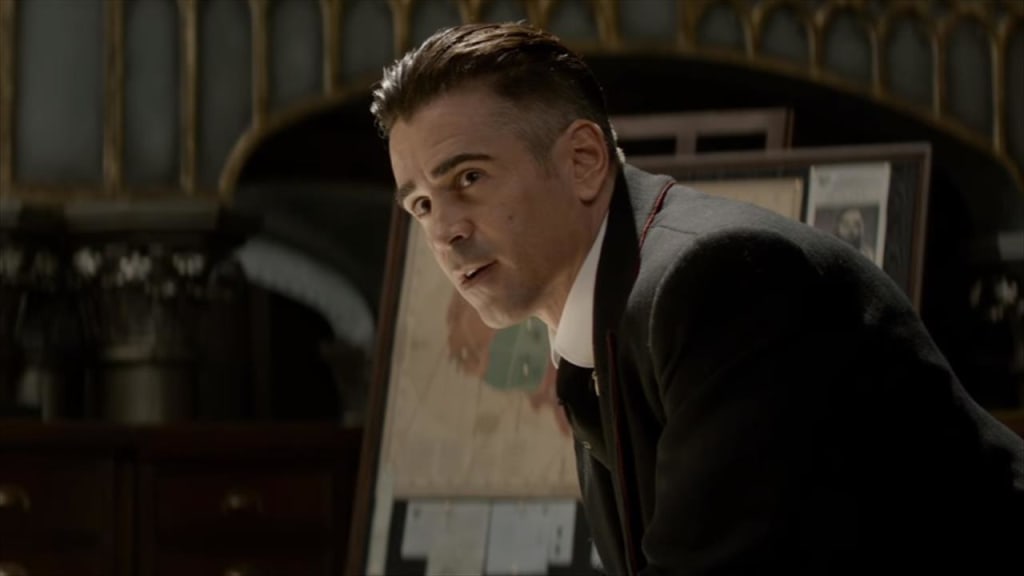
Although Fantastic Beasts and Where to Find Them is a standalone film, it should come as no surprise to Harry Potter fans that it's well-connected to the wider Wizarding World. We all know the genius of J. K. Rowling, so many were anticipating seeing how the threads of the Wizarding World subtly tie together in Fantastic Beasts. In one disturbing scene (toned down a little in the theatrical release), J. K. Rowling teases a very ominous relationship between Grindelwald and Credence. This relationship raises difficult questions about the historical relationship between the dark wizard and Albus Dumbledore himself...
The Scene in Question
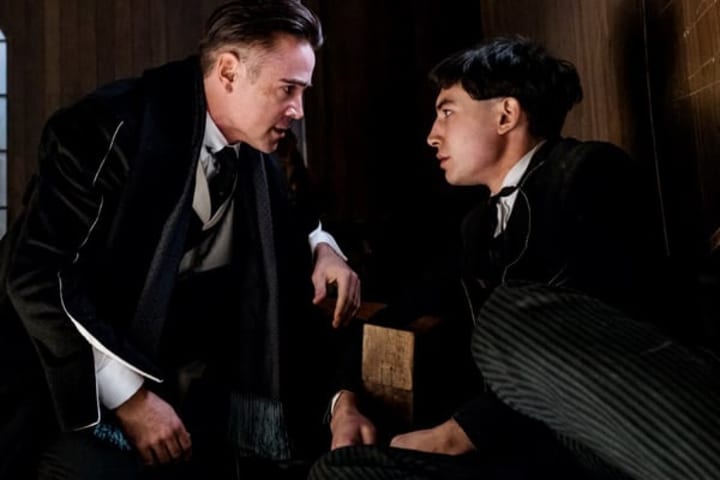
An earlier scene. Image: Warner Bros.
To put in mildly, the scene in question is actually fairly disturbing. Colin Farrell's Percival Graves (in reality Grindelwald) is manipulating Ezra Miller's Credence in order to find a powerful wizard who has been suppressing their magic for far too long, and is beginning to go out of control. In the film, there's a subtle dynamic of power, with Graves promising Credence that he'll be famous in the Wizarding World for accomplishing this deed. But in one critical moment, as Credence reels in shock and pain after being beaten by his foster-mother, you get a sense that something else is going on.
It almost feels like Credence is being groomed. It feels as though he's a closet homosexual, and Graves is manipulating the poor kid's sexuality in order to get what he wants. It's probably the most disturbing scene in the film, but it's done so subtly, that it's quite easy to miss.
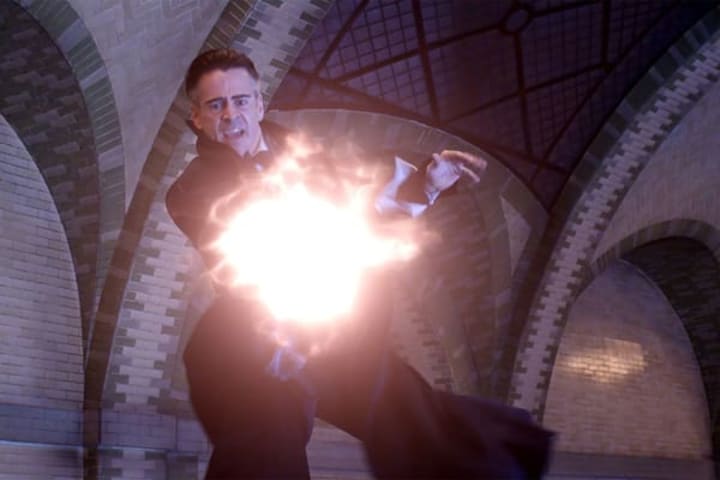
A dangerous man. Image: Warner Bros.
Here's the thing; in the original screenplay, that sense of Credence being groomed, of his sexuality being manipulated, is even stronger. The film actually tones it down, likely in order to get its PG-13 age rating.
"GRAVES gently, almost seductively, moves his thumb across the cuts, healing them instantly. CREDENCE stares...GRAVES seems to make a decision. He puts on an earnest, trustworthy expression as, from his pocket, he produces a chain bearing the symbol of the Deathly Hallows.GRAVES: I want you to have this, Credence. I would trust very few with it -GRAVES moves close, placing the chain around CREDENCE's neck as he whispers.GRAVES: Very few.GRAVES places his hands on either side of CREDENCE's neck, drawing him in, his speech quiet, intimate.GRAVES: ...but you - you're different.CREDENCE is unsure, both nervous of and attracted by GRAVE's behaviour...GRAVES moves even closer to CREDENCE, his face inches from the boy's neck - the effect is both alluring and threatening - as he whispers.GRAVES: Do this and you will be honoured among wizards. For ever.GRAVES pulls CREDENCE into a hug which, with his hand on CREDENCE's neck, seems more controlling than affectionate. CREDENCE, overwhelmed by the seeming affection, closes his eyes and relaxes slightly."
You see what I mean? The actual film does this subtly enough that it doesn't leap out at the average viewer, but the screenplay itself makes it abundantly clear that Graves is using Credence's sexual attraction against him. It's a deeply disturbing scene — but one that also raises troubling questions for Harry Potter fans.
As any Harry Potter fan will know, Grindelwald is a dark wizard who was first mentioned in Harry Potter and the Sorcerer's Stone. Where Fantastic Beasts is set in 1926, by 1945 Grindelwald will have become a powerful dark wizard whose base of operations is in Germany. Finally, Dumbledore himself will defeat the sorcerer.
In The Deathly Hallows, we finally got more details. We learned that Dumbledore and Grindelwald were once close friends, both fascinated with the hunt for the Deathly Hallows, and that Dumbledore was blind to Grindelwald's evil. It all culminated in a heated argument between Dumbledore and his brother, and soon you had a three-way magical duel — one that claimed the life of Dumbledore's sister. As Grindelwald grew in power, Dumbledore kept out of it, troubled by the feelings his old friend still evoked. Finally, in 1945 Dumbledore knew he could hold back no longer, and the result was the ultimate Wizard's Duel. It's very likely that the Fantastic Beasts series, which we know will end in 1945, will lead to that climactic battle.
But J. K. Rowling has openly admitted that there's another side to this story, one that we've yet to see. She explained:
"I always thought of Dumbledore as gay. Dumbledore fell in love with Grindelwald, and that that added to his horror when Grindelwald showed himself to be what he was ... He met someone as brilliant as he was, and rather like Bellatrix [with Voldemort] he was very drawn to this brilliant person, and horribly, terribly let down by him ... In fact, recently I was in a script read through for the sixth film, and they had Dumbledore saying a line to Harry early in the script saying 'I knew a girl once, whose hair...' [laughter]. I had to write a little note in the margin and slide it along to the scriptwriter, 'Dumbledore’s gay!'"
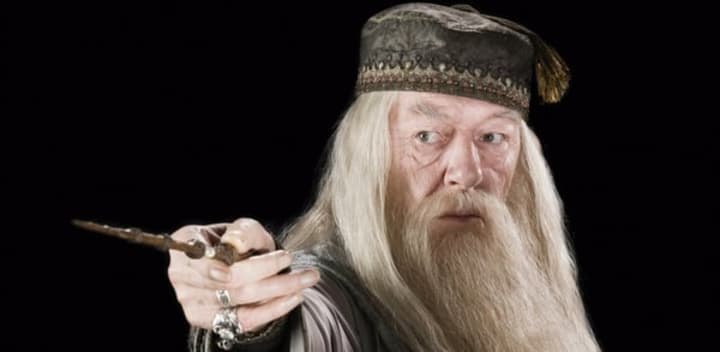
Don't mess with the headmaster. Image: Warner Bros.
Grindelwald wasn't just a friend. Dumbledore was in love with him, drawn to this "brilliant person". Disturbingly, the fact that Grindelwald uses Credence's sexuality against him raises the possibility that he groomed the younger Albus Dumbledore in the same way, that he teased Dumbledore's desires, manipulating him into helping him seek out the Deathly Hallows. His brother Aberforth saw through Grindelwald, though, and Grindelwald's true nature exploded into view in a three-way battle at Godric's Hollow, the Dumbledore home. The result was the tragic death of Ariana Dumbledore, and Albus would never forgive himself.
This could yet be darker still. My fellow writer Karly Rayner has — most likely correctly — suggested that Ariana Dumbledore was herself an Obscurial. When Ariana was just six, she was seen practising magic by a group of Muggle boys. They attacked her, with devastating consequences; she repressed her power, refusing to use magic, until it sometimes exploded out of her unpredictably. Karly's theory sounds spot-on to me, and raises the disturbing possibility that Grindelwald may never have been interested in Albus Dumbledore. It's possible that he only went to Godric's Hollow in order to meet Ariana, and to get close to an Obscurial. (Of course, it's also possible that this was when he learned about Obscurials. Given that these tales are written by J. K. Rowling, we can expect to learn more as the series goes on. Still, for now, the fact remains that Albus Dumbledore's history has become infinitely darker.)
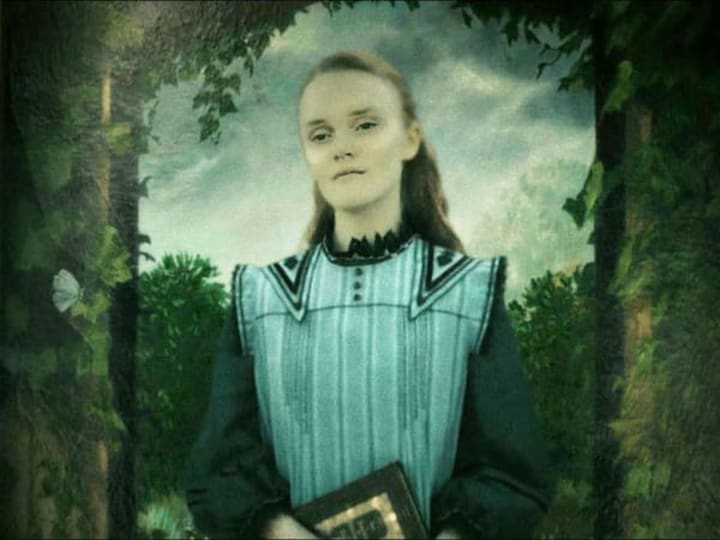
A portrait of Ariana Dumbledore, seen in The Deathly Hallows. Image: Warner Bros.
If I'm right, then Dumbledore was actually another of Grindelwald's victims, a survivor of a form of sexual abuse. We know from The Deathly Hallows that the truth about Dumbledore's past relationship with Grindelwald was buried, and with that truth Dumbledore also hid his own feelings of shame and guilt. These were brought to the fore when he sipped from Voldemort's cup in Harry Potter and the Half-Blood Prince; his mind swept back to Grindelwald's betrayal, and to his sister's tragic death. He would never recover from Grindelwald's abuse.
This is one of the most fascinating aspects of Fantastic Beasts; by stepping into the past and introducing us to key characters in Harry Potter's wider mythology, it shines a light on other characters we know and love. It's pretty certain that the sequels will gradually shift focus to Dumbledore himself, and will ultimately end in that final battle between Dumbledore and the man he fell in love with. This series is set to be heart-wrenching.
About the Creator
Tom Bacon
A prolific writer and film fan, Tom has a deep love of the superhero genre.


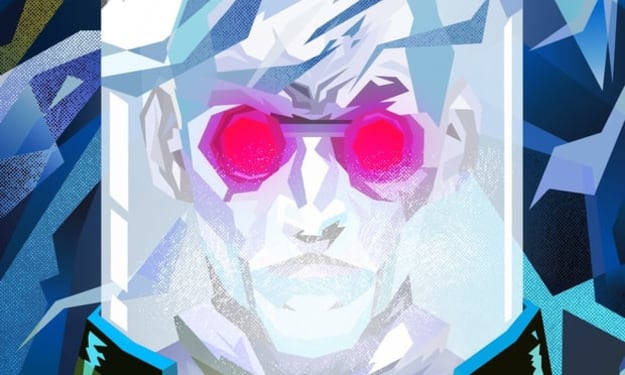

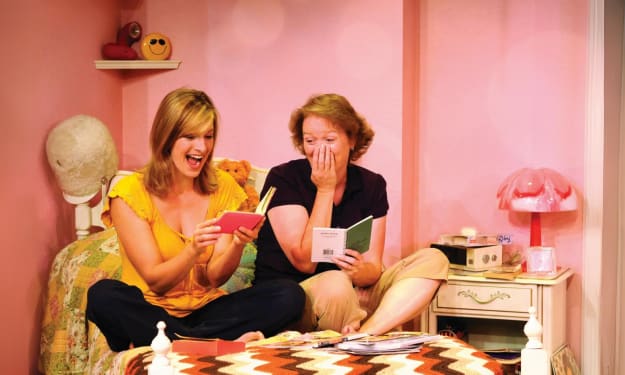

Comments
There are no comments for this story
Be the first to respond and start the conversation.